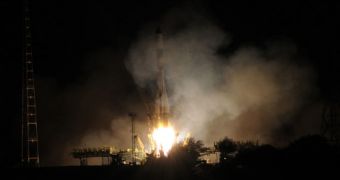Officials at the Russian Federal Space Agency (RosCosmos) announce that a new unmanned cargo space capsule has just taken off for the International Space Station (ISS) for Kazakhstan.
The Progress 40 spacecraft took off from the Baikonur Cosmodrome, in the Kazakh steppes, and its is taking vital supplies, experiments and spare parts to the station just a week ahead of space shuttle Discovery's launch, planned for November 1.
The Soyuz rocket carrying the Progress spacecraft took off at around 1511 GMT Wednesday, October 27, and is scheduled to arrived at the ISS in two days.
The automated transfer system on the capsule will allow for it to catch up with the ISS on Saturday, October 30, and to dock to the orbital facility at around 1639 GMT.
Progress 40, also known by its Russian designation M-08M, already unfurled its communications and navigations antennas, and has also opened up its 35-foot solar panels for energy production.
The capsule will take the place of another Progress spacecraft, which was ejected from a docking port on the Pirs module this Monday. M-08M is scheduled to remain on the ISS until mid-January 2011.
Food, spare parts, life support gear and experiment hardware make up for about.2,804 pounds of Progress' new cargo.
Additionally, 1,918 pounds of propellant will also be delivered to the six-astronaut crew aboard the ISS, for transfer into the Russian segment of the complex. The fuel will feed the facility's maneuvering thrusters.
Astronauts will also get 498 pounds of water and 1,100 pounds of oxygen, to replenish the station's systems, the official flight manifest shows.
After the ISS crew finishes up with arranging Progress' cargo, they will also have to deal with Discovery. The shuttle is launching on November 1 from Launch Pad 39A at the Kennedy Space Center (KSC), in Florida.
It will deliver a new Multipurpose Logistics Module (MLM), as well as the first humanoid robot in space, Robonaut-2. The machine was developed by NASA and General Motors.
Discovery will remain attached to the ISS for about 11 days, during which time its astronauts will conduct two extra-vehicular activities (EVA) for maintenance purposes, Space reports.
The STS-133 mission will be the orbiter's last flight ever. Discovery is the oldest shuttle in the fleet, and this last flight will be its 39th.
Video description: the Progress 40 spacecraft, enclosed in its payload fairing, is being delivered to a Baikonur Cosmodrome launch pad aboard a Soyuz rocket
Video credit: RosCosmos

 14 DAY TRIAL //
14 DAY TRIAL //